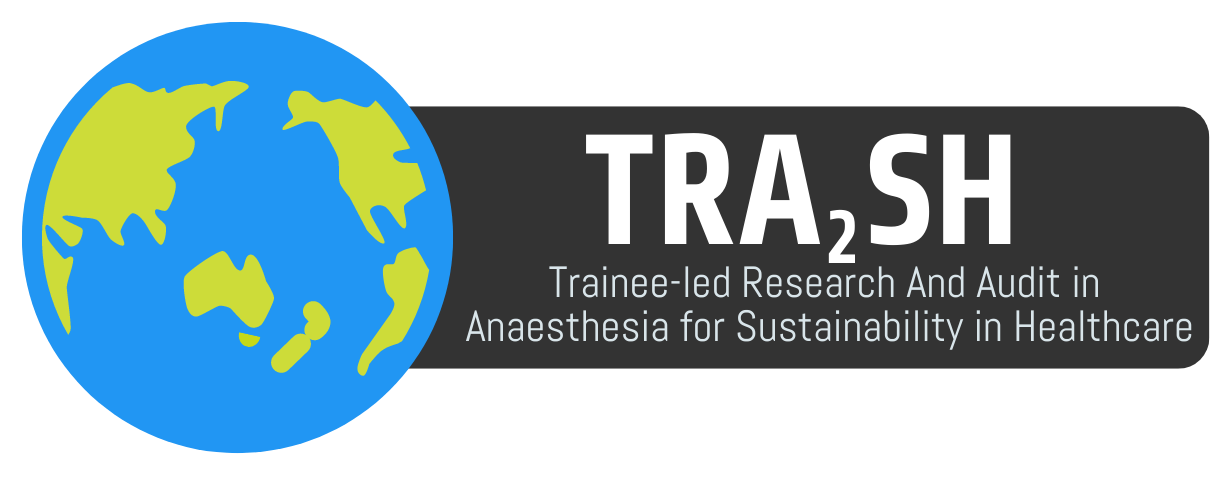
Operation Clean Up
#Operation Clean Up is on 30th June 2023
Operation Clean Up 2023 will be the day before beginning Plastic Free July
What better way to kick off a plastic reduction month than with Operation Clean Up?
Our targets this year are:
Refuse desflurane or N2O
Reduce disposable absorbent pads (blueys, greenies, incopads, chux)
Reuse drug trays (or other equipment)
Recycle and improve your waste streams (sharps audit or clinical waste audits)
Redirect pharmaceutical waste
Or you can choose your own targets (we have some other suggestions in our resources)
We’ve published a special article about Operation Clean Up in the Anaesthesia and Intensive Care Journal in 2023
By signing up you are expressing interest in undertaking Operation Clean Up. You can opt out at any time and are not obliged to participate in Operation Clean Up further (but we’d like you to!). TRA2SH will email a post-Operation Clean Up survey which takes <5 minutes to complete. The survey is optional but we appreciate your help in making Operation Clean Up better each year!
TRA2SH acknowledges the Australian Society of Anaesthetists Small Grant awarded to TRA2SH in 2023 that supports Operation Clean Up 2023 and its associated survey research. You can read about it in the ASA publication Australian Anaesthetist March 2023 issue.
-
Anyone can undertake Operation Clean Up but we think trainees are well placed to lead environmental changes. If you’re a Consultant why not sign up and recruit some juniors?
You will receive our info pack with journal articles, posters, presentations and infographics related to the bundle challenge.
There are no obligations if you sign-up but you will receive our updates on Operation Clean Up 2023
-
Our info pack has plenty of information but it comes down to:
-Engaging with your theatre team
-Identifying a potential intervention (use our 4R bundle)
-Finding information (see our procurement surveys)
-Feeding back to your department (presenting at a department meeting, share with staff)
-Advocating by presenting a peer-reviewed article to your department
-Leading by example
-Running your campaign in the lead up to Operation Clean Up day. Your day can be what you make it, but use the 6-8 weeks before to campaign, education and advertise what you want people to do.
You can find relevant papers in the ANZCA library environment guide. They have an updated list of relevant papers that can help you be evidence-based in your communications. If the link doesn’t work its also available here: https://libguides.anzca.edu.au/enviro/
-
Its really important that YOU collect local data to feedback to your department. This is one of the most effective methods of changing behaviour. We no longer collect your data (like in previous years) but we know that procurement data is really powerful. Use it to inform people.
How much waste does your hospital produce annually? How much goes to landfill?
How many drugtrays/laryngoscope blades/gowns/blueys (just examples!) does your department use per year?
Having those figures is really powerful. Read our paper in AIC for some more inspiration about how data can transform your campaign: Operation clean up: A model for eco-leadership and sustainability implementation
You can sign up for Operation Clean Up 2023 here or click the button above.
-
This can be a sustainability improvement project in its own right, or you can work with your scholar role tutor to create an audit project or present a peer-reviewed article to your department. We don’t create the audits for you anymore but if you have an idea - test it out and then let us share it so your idea can be a multicentre study!
-
Please fill in the post event survey to allow us to improve future OCU’s.
Learn more about Operation Clean Up from TRA2SH trainees
Listen to TRA2SH member Dr Noni Harold explain why reducing is so important.
Listen to Dr Noni Harold explain what OCU is all about
Collecting and using data.
Collecting data for Operation Clean Up is critical as you need to use that data to educate your department, nurses, surgeons and technicians/PSAs. Listen to TRA2SH member Dr Rose Cameron about what she did, who she spoke to and how she went about finding the right information.
Learn from Dr Rose Cameron about how she collected data and what she found useful.
“OCU 2023” post event survey
Complete the survey and help us understand how OCU went for you. Your experiences and opinions are valuable! Collating information from around the world will help us to understand your needs, our patients needs and importantly our planet’s needs. How can we improve if we don’t even know what is going on? This survey takes less than 5 mins.
No directly identifiable information is collected. All information is stored on a secure REDCap server in association with the University of Melbourne.
Survey opens after OCU 2023. The link will be sent to the email you used when you signed up for OCU.
-
Links not working?
Periodically the REDCap server will undergo maintenance. This is organised by the University of Melbourne.
If the “Sign Up” link or any of the Survey links are not working, try again later.
-
Got questions?
Read our FAQs.
Check out ANZCA’s sustainability library for more peer-reviewed articles.

